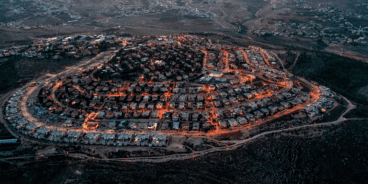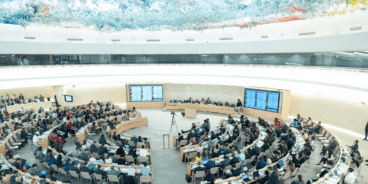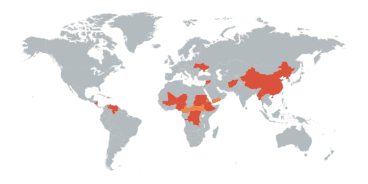
Statement for the Pre-Session of the 33rd Universal Periodic Review on the Democratic People’s Republic of Korea
Remarks delivered by Elisabeth Pramendorfer on behalf of the Global Centre for the Responsibility to Protect on 5 April 2019 in Geneva, Switzerland.
Dear colleagues,
Thank you for the opportunity to discuss the upcoming Universal Periodic Review (UPR) on the Democratic People’s Republic of Korea (DPRK). I am speaking on behalf of the Global Centre for the Responsibility to Protect, which was established in 2008 to promote universal acceptance and effective operational implementation of the norm of the Responsibility to Protect populations from genocide, war crimes, ethnic cleansing and crimes against humanity. As we seek to transform the principle of R2P into a practical guide for action in the face of mass atrocities, the situation in DPRK continues to be of particular concern, as alleged crimes against humanity continue to be committed by the state authorities against North Korean civilians.
My presentation will focus on two key issues, which we believe require utmost attention – accountability for alleged crimes against humanity and ongoing systematic violations of civil and political rights.
The 2014 report of the UN Human Rights Council-mandated Commission of Inquiry (CoI) on Human Rights in the DRPK established responsibility at the highest level of the government for murder, enslavement, torture, rape and the enforced disappearance of persons, among other conscience-shocking crimes, possibly amounting to crimes against humanity.
Also in 2014, the government of DPRK accepted over 100 out of the 269 recommendations made during its last UPR. However, five years since the release of the CoI findings and the last UPR cycle, possible crimes against humanity continue to be committed in the country. In December 2018, the UN General Assembly condemned these “ongoing systematic, widespread and gross violations of human rights.”
ACCOUNTABILITY/IMPUNITY
With regard to accountability, during the last UPR cycle the government of DPRK accepted a recommendation made by Argentina to “take all necessary measures to ensure the fight against impunity for the perpetrators of crimes, acts of violence and all human rights violations” (124.117). Regrettably, the government continues to deny the findings of the Commission of Inquiry and has not taken any meaningful steps to ensure accountability for alleged crimes against humanity and other serious violations of human rights. The absence of an independent judiciary in DPRK prohibits domestic accountability processes, while the government has refused to cooperate with relevant international mechanisms, including the group of independent experts on accountability and the Office of the UN High Commissioner for Human Rights (OHCHR).
Furthermore, despite accepting a recommendation made by Estonia to “cooperate with the special procedures of the Human Rights Council” (124.17), over the past five years the government of DPRK has continuously denied access to the Special Rapporteur on the situation of human rights in the DPRK. As a result, a culture of impunity persists, enabling the ongoing perpetration of mass atrocities.
CIVIL AND POLITICAL RIGHTS
Civil and political rights also continue to be violated in a widespread and systematic manner, despite DPRK having supported a recommendation by Argentina to “make efforts to achieve respect for all fundamental rights and freedoms of the entire population” (124.117). These violations include the continued existence of political prisons, where conscience-shocking crimes are committed daily. According to the Inquiry on Crimes Against Humanity in North Korean Political Prisons (conducted by Judges Navi Pillay, Thomas Buergenthal, and Mark Harmon) whose findings were published a little over a year ago, ten of the eleven crimes against humanity enumerated in the Rome Statute continue to be committed in DPRK’s political prisons. The ten crimes are murder, extermination, enslavement, forcible transfer, imprisonment, torture, sexual violence, persecution, enforced disappearances and other inhumane acts. Various reports indicate that an estimated 100,000 people currently remain in detention as political prisoners.
Attempts by DPRK citizens to exercise their civil and political rights are routinely treated as political crimes, resulting in arrest and imprisonment. Although the government of DPRK accepted a recommendation by Indonesia to “create conditions conducive for people to exercise freedom of expression” (124.130) and a recommendation by Myanmar to “take practical measures to ensure citizens’ rights to free access to information” (124.137), there continues to be no independent media nor civil society in the country. Additionally, despite having signed and ratified the International Covenant on Civil and Political Rights, DPRK does not presently fulfill its treaty obligations.
The government of DPRK also accepted a recommendation made by India to facilitate travel of its citizens abroad (124.125). Since the last review, however, the government has further restricted the ability of its people to travel without prior permission and have systematically subjected persons who have traveled abroad to arrest, detention and other ill-treatment.
Lastly, the government of DPRK should be reminded that it accepted a recommendation made by Uzbekistan to “increase the level of well-being of the population” (124.27). In order to do so it must urgently halt abuses and violations, which as multiple reports and assessments allege, rise to the level of crimes against humanity. The DPRK government bears the primary Responsibility to Protect its population from crimes against humanity and it must demonstrate to the international community that it is willing to do so.
Please consider making the following recommendations for action to the government of DPRK:
- Support accountability efforts for human rights violations, some of which may amount to crimes against humanity, by allowing conditions for an independent judiciary and through cooperation with relevant international bodies;
- Fulfill treaty obligations under the International Covenant on Civil and Political Rights and allow the population to exercise all civil and political rights, including freedom of expression, access to information and ability to travel;
- Grant access to the Special Rapporteur on the situation of human rights in DPRK, as well as other UN Special Procedures mandate holders and OHCHR;
- Fully implement the recommendations provided in the CoI report, including releasing all political prisoners and allowing the establishment of independent newspapers and other media;
- Ratify the Convention against Torture and Other Cruel, Inhuman or Degrading Treatment or Punishment, the International Convention for the Protection of All Persons from Enforced Disappearance and the Rome Statute of the International Criminal Court.
Thank you.

